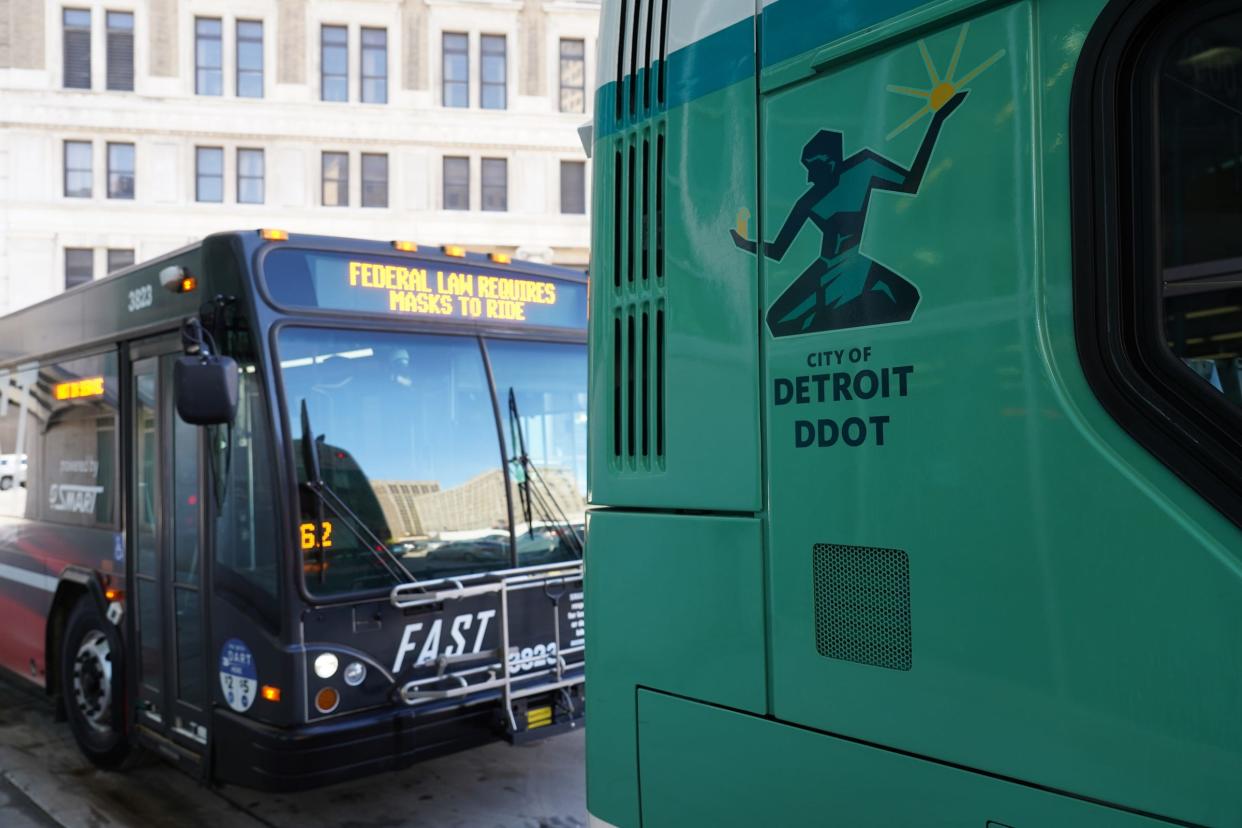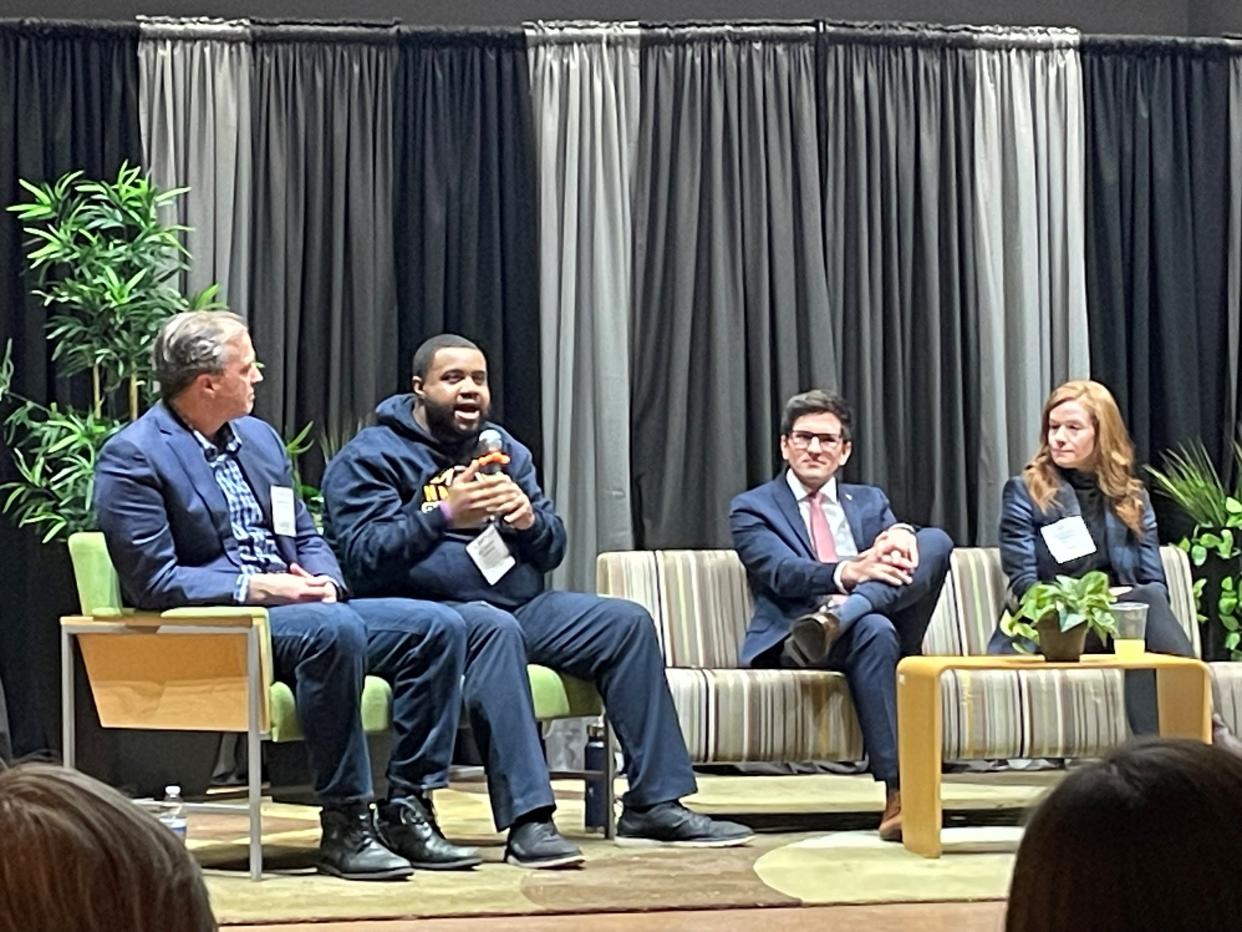Mallory McMorrow: Legislators who don't work on transit needs should be voted out

For state Rep. Donavan McKinney, going to high school was a challenge.
It wasn’t the subject matter, it was the trip to and from school.
McKinney, a Democrat who now represents parts of Detroit and Macomb County in the Michigan Legislature, recounted the regular trip from his home near Seven Mile Road and Van Dyke Avenue in northeast Detroit to Renaissance High School in northwest Detroit. Like plenty of other kids, he didn’t attend his neighborhood high school so he had to travel, but transit limitations meant a long journey of riding the bus and walking for considerable time each way.
“Most of that time spent was just waiting,” he said Tuesday night. “We need to do better.”
McKinney, who noted that he loved the bus growing up, was speaking to a crowd at the Wayne State University Industry Innovation Center in Detroit that appreciates what he went through but also has hopes that the region is moving toward something better. It was part of the State of Transit 2024, an annual event hosted by the advocacy group Transportation Riders United.
This year in addition to discussions with leaders from metro Detroit’s main transit agencies, the event included a state policymaker panel with state Sens. Mallory McMorrow, D-Royal Oak, and Jeff Irwin, D-Ann Arbor; and state Reps. McKinney and Jason Morgan, D-Ann Arbor, along with state Chief Infrastructure Officer Zach Kolodin.
All spoke of their desire to improve transit.

Irwin described transit as one of the “big gaping holes” in the region, noting that “when you connect people good things happen.” He said he’s working on efforts to fix Regional Transit Authority legislation, which he said basically takes rail projects off the table. He implored the audience to keep asking officials about transit.
McMorrow spoke of transit as economic development, pointing to the region’s failed bid to attract Amazon’s second headquarters in 2018 or even be considered as a finalist because of a lack of education and transit investments, despite offering $4 billion in incentives.
Local community leaders, she noted, often describe transit needs but fail to seek funding for it.
More: Detroit boosting service on key bus route as it begins bus rapid transit pilot project
McMorrow and Irwin implored the audience, estimated at more than 75 people, mostly transit supporters and those affiliated with transit agencies, to spread the word to elected officials about how important they view transit as an issue. McMorrow said it needs to be made clear that elected officials will get voted out of office if they don’t act on it.
Morgan identified the recently formed transit caucus, which now has 36 members, including one Republican, as a key effort in the Legislature. He said he’s looking toward legislation that would significantly boost local bus operating funds.
Megan Owens, executive director of Transportation Riders United, described reliability as the biggest struggle locally and nationally. But some changes could help on that front.
More: RTA weighing proposal for QLINE control
Those include a $3-an-hour wage increase for Detroit Department of Transportation drivers and what was described as a potentially historic increase expected for drivers at the Suburban Mobility Authority for Regional Transportation, or SMART, as contract negotiations move forward there. Higher bus driver salaries, it’s hoped, will help alleviate what’s become a chronic driver shortage. That situation isn’t unique to metro Detroit, but this region is notable for its lower rates of driver pay.
Talk of the pay increases garnered significant applause from the audience, which also clapped when talk turned to progress so far on making transit available, specifically SMART expansion into Novi and Wixom with Rochester and Waterford listed as being up next.
Highlighting an area of potential opportunity, Owens referenced filling in the gaps in Wayne County, which has numerous communities that opt-out of SMART.
Despite the areas of progress, transit in Michigan has been hampered by chronic underinvestment for many years, according to advocates, who point to that as a key reason young people choose to leave the state.
Owens used a chart to show how state funding for transit has been largely flat for more than 20 years while funding for roads, which already outpaced transit substantially, has continued to climb.
Another chart, showing 2016 per capita transit funding, showed dozens of cities, with Detroit near the bottom, just behind Virginia Beach, Virginia, and just in front of San Juan, Puerto Rico.
Contact Eric D. Lawrence: elawrence@freepress.com. Become a subscriber.
This article originally appeared on Detroit Free Press: McMorrow tells Detroit audience: Tie your vote to support for transit
